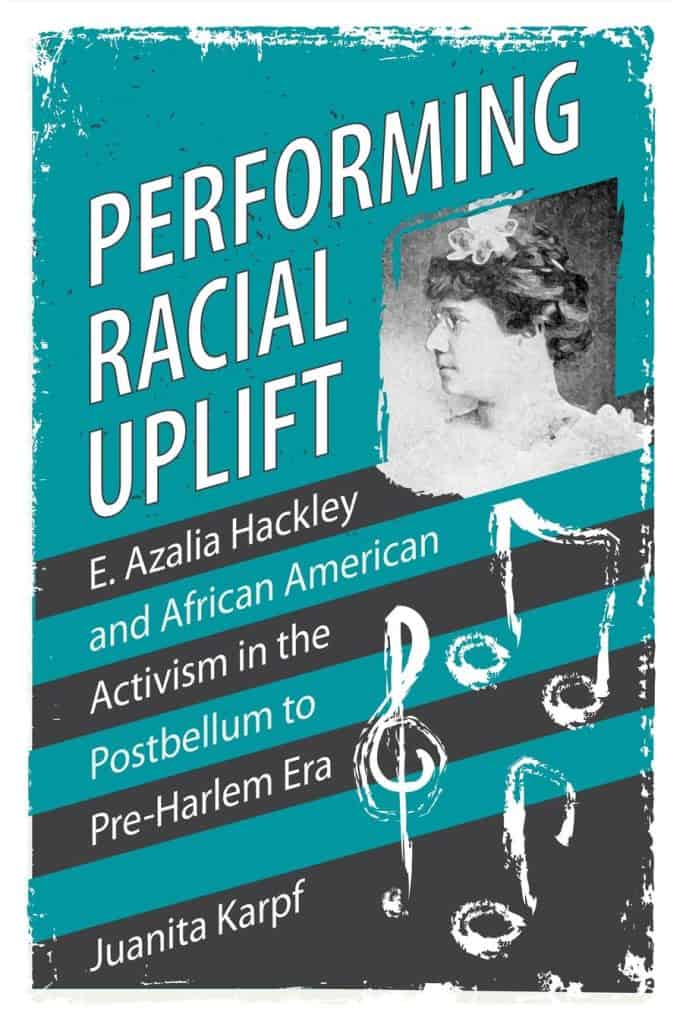Books

2023: CHOICE Outstanding Academic Title. CHOICE is an affiliate of the American Library Association.
2022: History of Education Society, Outstanding Book Award Nominee

University Press of Mississippi
Performing Racial Uplift: E. Azalia Hackley and African American Activism in the Postbellum to Pre-Harlem Era
A groundbreaking rediscovery of a classically trained innovator and powerful teacher who set milestones for African American singers and musicians
In Performing Racial Uplift: E. Azalia Hackley and African American Activism in the Postbellum to Pre-Harlem Era, Juanita Karpf rediscovers the career of Black activist E. Azalia Hackley (1867–1922), a concert artist, nationally famous music teacher, and charismatic lecturer. Growing up in Black Detroit, she began touring as a pianist and soprano soloist while only in her teens. By the late 1910s, she had toured coast-to-coast, earning glowing reviews. Her concert repertoire consisted of an innovative blend of spirituals, popular ballads, virtuosic showstoppers, and classical pieces. She also taught music while on tour and visited several hundred Black schools, churches, and communities during her career. She traveled overseas and, in London and Paris, studied singing with William Shakespeare and Jean de Reszke—two of the classical music world’s most renowned teachers.
Her acceptance into these famous studios confirmed her extraordinary musicianship, a “first” for an African American singer. She established the Normal Vocal Institute in Chicago, the first music school founded by a Black performer to offer teacher training to aspiring African American musicians.
Hackley’s activist philosophy was unique. Unlike most activists of her era, she did not align herself unequivocally with either Booker T. Washington or W. E. B. Du Bois. Instead, she created her own mediatory philosophical approach. To carry out her agenda, she harnessed such strategies as giving music lessons to large audiences and delivering lectures on the ecumenical religious movement known as New Thought. In this book, Karpf reclaims Hackley’s legacy and details the talent, energy, determination, and unprecedented worldview she brought to the cause of racial uplift.
Reviews
Benjamen W. Douglas, University of Arizona
“In Performing Racial Uplift, Juanita Karpf makes an important contribution to our awareness and understanding of a phenomenal musician, activist, and educator, as well as the era in which she lived. Although Madame Emma Azalia Smith Hackley (1867–1922) has largely faded from memory and public record, Karpf’s decades of research create a surprisingly comprehensive account and one which provides rich historical contextualization.”
Toni P. Anderson, author of Tell Them We Are Singing for Jesus: The Original Fisk Jubilee Singers and Christian Reconstruction, 1871–1878
“Juanita Karpf’s insightful and probing analysis of Azalia Hackley—performer, music educator, author, lecturer, and activist—offers a fascinating and nuanced look at this gifted concert artist and her unique strategies for uplift activism. Endowed with charisma and guided by a lifelong commitment to the tenets of the New Thought Movement, Hackley passionately pursued an approach to music education for the masses that instilled racial pride and self-esteem. She modeled expressions of resistance that found middle ground between the perceived binary stances of the Du Bois and Washington ideologies. Through engaging dialogue, detailed scholarship, and rich context, Performing Racial Uplift reawakens us to Azalia Hackley’s significant contribution as a pioneering musician and important leader of her race.”
Sarah Schmalenberger, University of St. Thomas, St. Paul, MN
“This book is a joy to read. . . . An exemplary model of research methods, this richly engaging book will appeal to and encourage readers across disciplines.”
Paul D. Sanders, Ohio State University
“ . . . explores Hackley’s life in a detailed, balanced manner, addressing both its richness and complexity in this important study.”
Tammy L. Kernodle, University Distinguished Professor of Music at Miami University in Ohio, and author of Soul on Soul: The Life and Music of Mary Lou Williams
“For too long the contributions of concert artist, educator, and impresario Azalia Hackley have been pushed into the margins of American music historiography. Performing Racial Uplift corrects this by offering a nuanced reading that not only captures the life of this transformational figure but situates Hackley into larger historical narratives that connect her with Black women activists such as Ida B. Wells, Anna Julia Cooper, and Frances Harper, who were also central in shaping the ideology of racial uplift in Gilded Age America.”